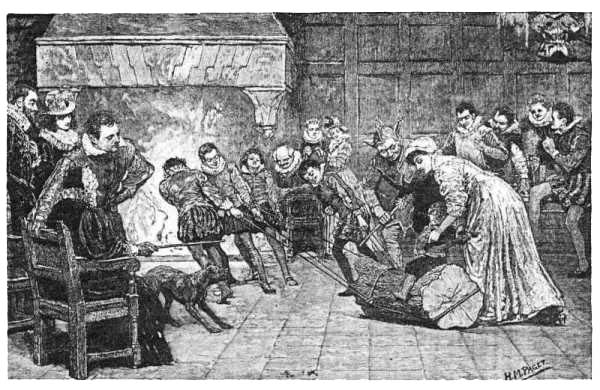Historyminion wise, I'm going to celebrate by posting a lot on the history of Christmas, traditions, and terrors.
Let's start with Yule versus Christmas. Is it really the same thing?
 |
| The Scandinavians in the 1500s getting ready to burn the Yule log and get wasted! Imp included. |
Yule goes back, way back, to the 700s. The word is from the Old English geol, geola "Christmas Day, Christmastide," from Old Norse jol (plural), a heathen feast, later taken over by Christianity, as a lot of things were. The priests wanted to con everyone into falling for their new fangled religion by adopting already know traditions. They were assholes like that.
The Old English giuli was the Anglo-Saxons' name for a two-month midwinter season corresponding to Roman December and January, a time of important feasts but not itself a festival. After conversion to Christianity it narrowed to mean "the 12-day feast of the Nativity" (which began Dec. 25), but was replaced by Christmas by the11th century. However, the northern areas of Danish settlement it remained the usual word and festival. Across Scandinavia, great yule logs were burned, and people drank mead around the bonfires listening to minstrel-poets singing ancient legends. It was believed that the yule log had the magical effect of helping the sun to shine more brightly.
Yule was revived in the 19th century by bored writers to mean "the Christmas of Merrie England." probably because it sounds sort of old and cool. Now neo-pagans like followers of Wicca, who I think like to pretend to be spell casters and like to run nude in the woods, celebrate Yule. For them, it's part of the Winter Solstice.
Very few people today would shout out "Happy Yule Tidings" or "Merry Yule" though.
Christmas, on the other hand, is not as old as Yule, but is up there. It's Middle English for Christemasse, which is from Old English Cristes mæsse, literally, Christ's mass. It was used before 12th century.
Early Roman texts and calenders (about 360 CE) mentions the celebration on December 25 of a Christian liturgical feast of the birth of Jesus. In Eastern Christianity, the birth of Jesus was celebrated, and still is on January 6th at the Epiphany. (When they figured out Jesus was god born as man). The Donatists of North Africa celebrated Christmas may indicate that the feast was established by the time that church was created in 311.
 |
| Roman carving of celebrating the God of Light, which the Christian god stole a lot of ideas from. Check out the halo. |
Next Time: How did they celebrate Christmas in Medieval Times? If you're expecting any gifts, you're going to be disappointed.
No comments:
Post a Comment